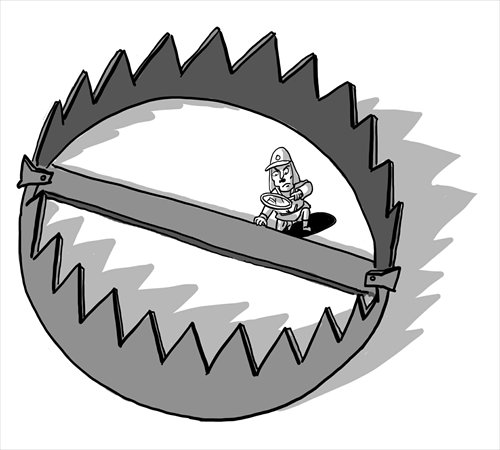HOME >> OP-ED
Respect will serve Chinese diplomacy best in long run
Source:Global Times Published: 2014-2-19 20:08:01

Illustration: Liu Rui/GT
Since the boat collision incident in 2010 and Japan's "nationalization" of the Senkaku (Diaoyu) Islands in 2012, China's diplomacy toward Japan has been dominated by a combative mood, which I think should switch to cooperation. The rest of the world will find it laughable to see two Asian powers so fiercely at odds with each other over these uninhabited islands.
The Sino-Japanese political relationship is currently in an ice age. Japanese people loathe many actions by the Chinese government, but in the meantime they consider the bilateral relationship a very important one that needs improvement. In my view it's the same with the Chinese people.
Japan-China relations have both resilient and fragile aspects: there are cultural and economic opportunities to improve the relationship, while territorial and historical issues remain weak points.
Obviously neither China's announcement of the Air Defense Identification Zone nor Japanese Prime Minister Shinzo Abe's visit to the Yasukuni Shrine made things better. In order to avoid the escalation of the situation, the leaders of the two countries should make their long-term policy toward the other side clearer and show their intention to improve ties.
Japan is China's neighbor for good. Japan is allied to the US to guarantee its national security, because its troops are for defense only and it has no nuclear weapons. They also share core values of democracy, but this doesn't mean there are no contradictions between them.
However, some Chinese even believe that strife between China and Japan serves the government's immediate interests. Some in China say that the tactic of China "hiding our capabilities and biding our time," proposed by Deng Xiaoping, has become outdated and the country should be more assertive.
In the 1970s and 1980s, some Japanese were arrogant about Japan's economic rise, and saw no need to learn from the US and European countries any more. Japan wouldn't have suffered the economic collapse if it had kept a low key attitude during the period.
It is not difficult to see possible risks arising out of China's rise both in military and economic strength. In this case, China should not be assertive and saber-rattling if it wants to achieve its goals. Quite the opposite, China just needs to keep smiling in dealing with other countries. The 21st century will not be an imperialist one, and only elegant and friendly diplomacy can win respect from other countries.
Some in China worry that the West wants to see the peaceful evolution of China. They feel defensive and always want to fight back. But times have changed. While it was understandable in the past for China to emphasize that backwardness exposes one to bully, it's not the case now. China needs not give any care to the view that Japan is attempting to encircle China - which country can succeed in this? Just be calm and confident, and then you will win respect from others.
As for the Senkaku (Diaoyu) Islands, both sides claim to be in the right side. The two sides should not physically act, but only verbally argue in the way that civilized countries handle disagreements.
With China's rise comes the question of how China will make use of its national power, which I hope will be done in a smart way. In 1973, premier Zhou Enlai told an American scholar, "China could embark on a hegemonic path. But if it does, you should oppose it. And you must inform that generation of Chinese that Zhou Enlai told you to do so."
Currently the rest of the world does not have enough trust in China due to some of its actions in the East China Sea and the South China Sea. Some find that China is extending the measures it uses internally to solving issues in external relations.
As the rule of law has not been fully implemented within the country, some issues are not addressed in accordance with law but throw power instead. This may prompt the outside world to doubt that China will abide by the laws of the international community. Besides, there are voices in China that say: Why cannot we do what the US has been doing? I suggest China should not emulate the US in some of their unilateral behavior. Since China itself has been criticizing the hegemony of the US, why does it want to pursue such a path?
The article was compiled by Global Times reporter Sun Xiaobo based on an interview with Professor Akio Takahara at the University of Tokyo. opinion@globaltimes.com.cn
Related articles:
Global focus needed to counteract Japanese right
Posted in: Viewpoint